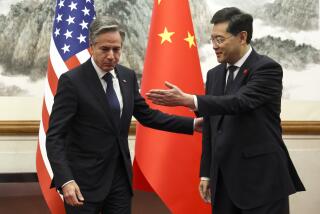Baker Says U.S. Shouldn’t Be Seen as ‘Somehow Inciting to Riot’ : Bush Plans to Deal With Crisis in China Gingerly and at Arm’s Length
- Share via
WASHINGTON — The Bush Administration served notice Saturday that it will avoid making any strong statements of support that might encourage the Chinese demonstrations for democracy, in effect rejecting calls from congressmen to have the United States give moral support to the movement.
“I do not think that we should in any way be seen to be somehow inciting to riot,” Secretary of State James A. Baker III told a news conference in Kennebunkport, Me. “ . . . I don’t think it’s in the best interest of the United States for us to see significant instability (in China).”
Another senior official said the Bush Administration is afraid of giving the Chinese demonstrators the wrong impression that the United States would be able to help them. In 1957, the Dwight D. Eisenhower Administration called for the “liberation of captive nations,” although he had offered no tangible help while an uprising against Hungary’s Communist regime was suppressed.
“We want to be prudent enough not to lead (Chinese) people to think that we have power over the situation, when we don’t,” explained one Administration official. “This is a Chinese event. We (the United States) want to stand outside it. We will condemn the use of force and specific violations of human rights when they occur.”
Issues New Travel Warning
The State Department issued a new warning Saturday on travel to China, advising Americans to defer any plans to travel to the country for the next three days.
Earlier last week, the Senate Foreign Relations Committee passed a resolution which endorsed the Chinese demonstrators’ call for democracy. On Saturday, William C. Triplett II, a Republican staff member for the committee, criticized the Administration for what he called weak statements on the events in China.
“The Congress is in sympathy with the forces of democracy,” he said. “It’s time for the Administration to follow the Congress.”
Asked at his news conference why the United States is not encouraging the Chinese demonstrators, Baker replied: “I think we should be expressing our support for freedom of speech, for democratization and for freedom of assembly. And that’s what we’re doing. I do not think that we should in any way be seen to be somehow inciting to riot, and I think that we have to be appropriate in our response.
“I think that reform (in China) has to proceed apace. . . . What may be happening here is that the economic reforms in China got out a little bit ahead of the political reforms,” the secretary observed.
One factor underlying the Bush Administration’s reticence in commenting on the Chinese situation is uncertainty over what will happen. In simplest terms, U.S. officials don’t know yet how successful the Chinese demonstrators will be.
What Kind of Revolution?
“The real question is whether we are talking about a revolution with a small r or a big one,” one Administration official said. “Are we talking about the kind of revolution that just leads to a minor change in the government or to one on the order of the French Revolution?”
“There is such a thing as crushing a movement,” said a U.S. official who specializes in Asian affairs. “How well is the democracy movement doing in Burma these days? The optimist in me says China has gone beyond that point, but I don’t know.”
(Last summer, Burmese authorities called in troops and used force to suppress widespread demonstrations for democracy.)
Another factor is the U.S. government’s reluctance to do or say anything that would disturb the military and intelligence cooperation between the United States and China.
The Times reported in 1981 that two U.S.-equipped intelligence stations, manned by Chinese technicians, had been installed in western China to monitor Soviet missile firings. Those intelligence stations were built to substitute for the electronic listening posts in northern Iran that were lost as a result of the Iranian revolution in 1979.
Over the past five years, the United States and China have also carried out a long series of consultations and exchanges on defense matters.
Leading officials of China’s People’s Liberation Army have made visits to the Pentagon, and senior Defense Department officials have toured army installations in China. A 1983 visit to China by then-Defense Secretary Caspar W. Weinberger cleared the way for these military ties.
Times staff writer David Lauter, in Kennebunkport, contributed to this story.
More to Read
Get the L.A. Times Politics newsletter
Deeply reported insights into legislation, politics and policy from Sacramento, Washington and beyond. In your inbox twice per week.
You may occasionally receive promotional content from the Los Angeles Times.










